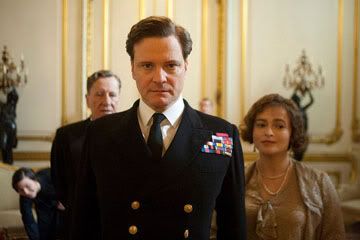

"The King's Speech" (2010)
I still believe Colin Firth deserved an Oscar for his role in last year's "A Single Man." This role in Tom Hooper's "The King's Speech," however, as the stammering King George VI is just as worthy. It's time for Firth to receive his Oscar now with two outstanding and memorable performances two years in a row. As in another film this holiday season, "The Fighter," we follow a real life person who needs to find his voice. He doesn't just need a family to listen, though; his entire country relies on his voice for reassurance in a time of need, a time when Britain is on the eve of war with Germany in 1939.
We begin with a man named Albert (Colin Firth), the Duke of York, before he is crowned king. It's 1925, and he is required to address the public at the British Empire Exhibition. He chokes on his words delivering a stuttering mess full of painful silences and stammering outbursts, a condition of speech he has lived with for as long as he can remember. It's only apparent now because of the public speaking demands of his royal position, and so he begins desperately seeking help from speech therapists. His wife (Helena Bonham Carter) thankfully stumbles upon a new possibility: a failed Australian actor named Lionel Logue (Geoffrey Rush) who takes his speech therapy practice very seriously. Geoffrey Rush delivers the film's other outstanding performance as the eccentric, expressive, clever and well-humored Logue.
The film is greatly about the give-and-take, lifelong relationship that forms between Albert, referred to as "Bertie" in the speech therapy sessions by the insistent Logue, and Logue himself. Logue realizes the only way to properly instruct as a therapist to royalty is to lower him to the same level. It's a method Albert finds deplorable at first but warms up to only upon realizing it's getting him the results he wants. He's beginning to speak better. These two roles are extremely well written from screenwriter David Seidler, and they work best when sparring with each other. Albert's sessions with Logue are the lively highlights especially during a scene where Logue suggests Albert shout vulgarities to get his words out, a scene that inappropriately earned the film its R rating. But this isn't the place to rant about the MPAA.
The need for Albert to get rid of his stammer gets elevated with more urgency as the stresses of the monarchy unfold. Albert's father, George V (Michael Gambon), frowns upon the dawn of radio technology forcing monarchs to place themselves into the living rooms of their people. Also because it prevents his preferred son from properly taking the thrown with security. The other son is Edward (Guy Pearce) who does take the thrown after the untimely death of George V but only briefly. He's in love with Wallis Simpson (Eve Best), an American woman twice divorced. She would not be accepted into royalty, so Edward's only choice is to flee. This leaves Albert to become King George VI.
This places pressure on both Albert as king and Logue now as a king's therapist, and through the interplay of their growing relationship against the ominous threat of the wider sphere where Hitler is gaining power in Germany, the film becomes a fascinating blend of personal drama and historical period piece, one about friendship, loyalty and bravery, thanks to deft direction from Tom Hooper ("The Damned United," HBO's "John Adams").
A rich supporting cast fleshes out the strength of the two leads including Michael Gambon and Guy Pearce as part of Albert's royal family and even Timothy Spall as Winston Churchill. Helena Bonham Carter is also magnificent as Albert's loving and sympathetic wife. We're used to seeing her in such dastardly roles as in the "Harry Potter" films, but here she is quite the opposite and quite lovely.
Cinematographer Danny Cohen captures the scenes in an interesting way with tight, narrow framing which is unique for a lush and historically accurate period piece. Best is when the frame is filled with Albert's horrified, sweaty face placed before a radio microphone, the red flashing light reflecting off his skin. This arrives when he must deliver his first wartime speech, the pivotal moment to all of which "The King's Speech" builds up. Hooper expertly handles this final scene which escalates in tension as composer Alexandre Desplat uses the grandeur of Beethoven's Seventh Symphony.
In this moment we absolutely feel the nerve-racking and pulse-pounding anxiety right there with Albert, a moment that boasts a walloping emotional impact. "The King's Speech" is about speech in two senses of the word. King George VI had to learn to control his speech in order to give the most importance speech of his lifetime.





No comments:
Post a Comment